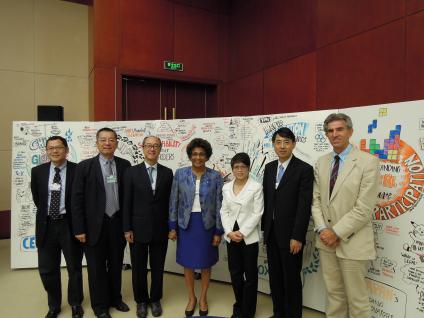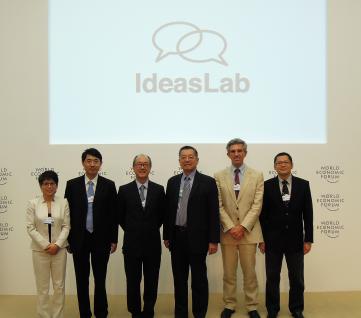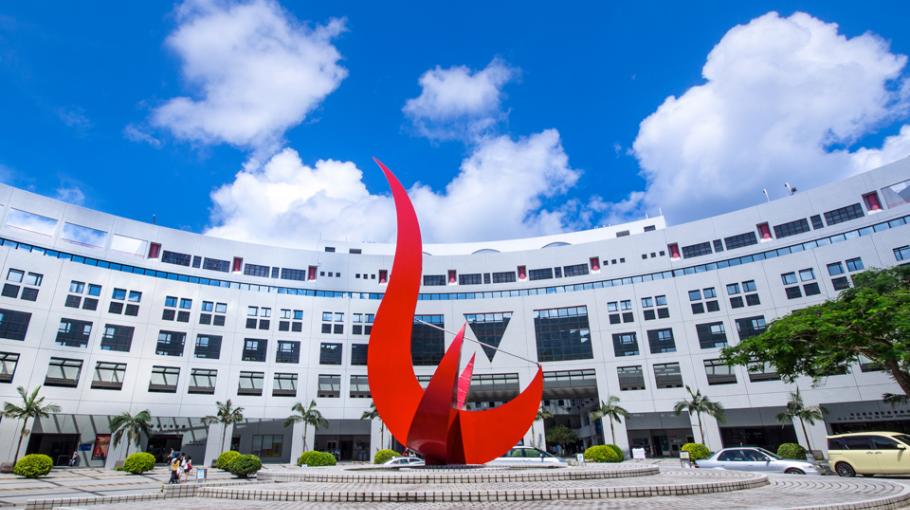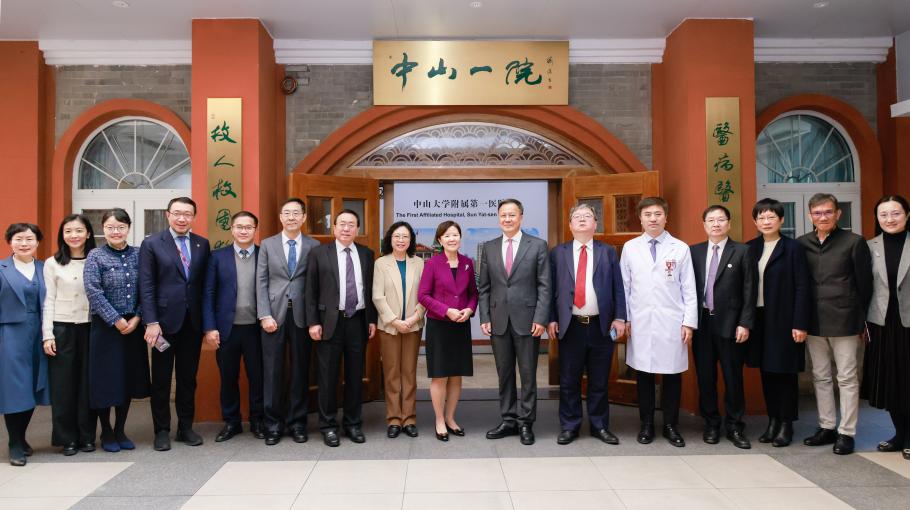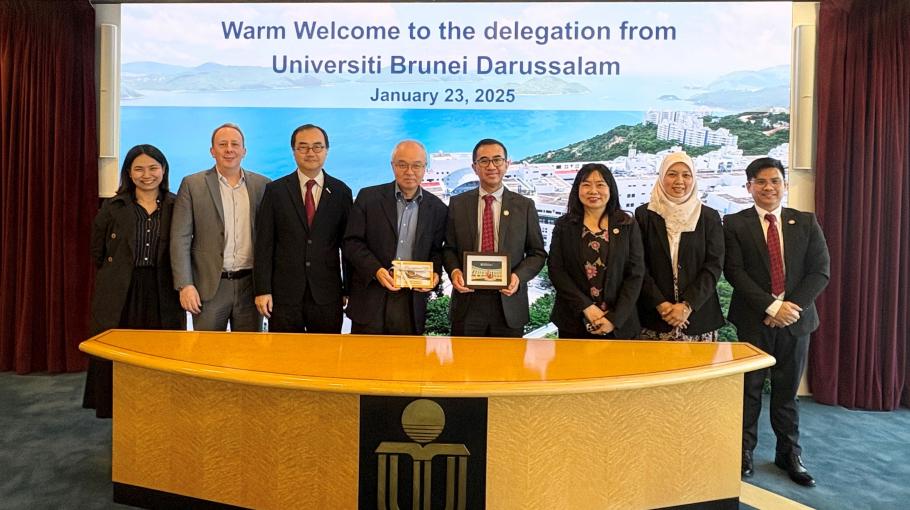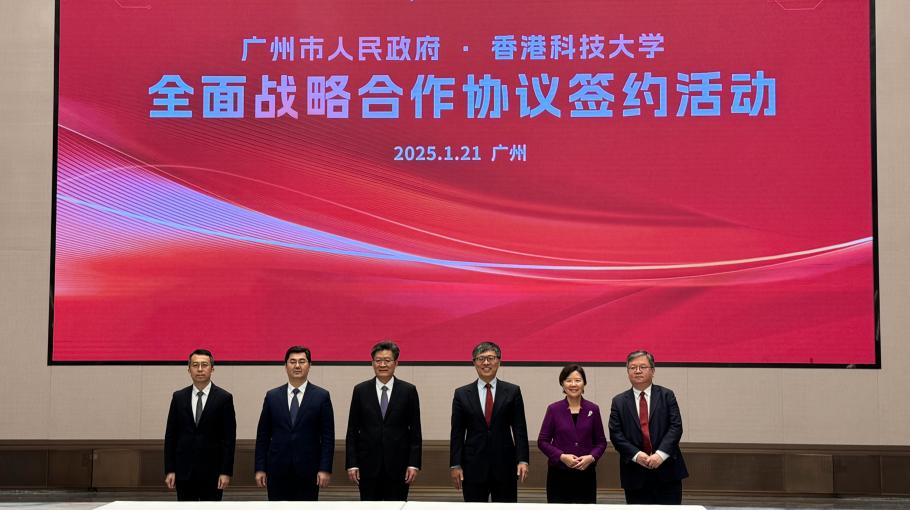The Hong Kong University of Science and Technology (HKUST) became the one and only higher education institution in Hong Kong invited by the World Economic Forum Annual Meeting 2012 to present at IdeasLab, a presentation and discussion session shining light on the latest developments of environmental sustainability and offering solutions to various types of cross-boundary pollution. Convened in Tianjin, China in September, the World Economic Forum was officiated by Premier Wen Jiabao with the theme of 'Creating the Future Economy'. Over 2000 political and civil society leaders, academics, experts and global entrepreneurs from over 80 counties joined the dialogues, offering extraordinary insights into innovation, energy and resources, mobility, infrastructure and urban development, health among other topics of interest.
Under the working theme of 'Sustainability without Borders', experts and scholars of HKUST were specially invited to present their ideas at IdeasLab for challenges confronting sustainable development in the Pearl River Delta region and offer possible solutions. Amongst other participating leading institutions were the Massachusetts Institute of Technology, University of Oxford, Tsinghua University and National University of Singapore. Sustainability being one of the University's high-impact research areas that rank amongst the world's best, HKUST has made special efforts to enhance its edge through setting up the Interdisciplinary Programs Office. By creating a strong nexus between science, technology, business, humanities and social science, building strategic partnerships with government and industry, and pioneering innovative initiatives in biomedical engineering and environmental science, the Office successfully nurtures versatile individuals that are capable of rising above challenges for environmental protection and public health.
Prof Tony F Chan, President said that HKUST faculty members were privileged to be sole Hong Kong representatives to take part in the World Economic Forum this year. And HKUST is also the first university in Hong Kong ever to preside over the IdeasLab session at the WEF Summer Davos. The opportunity to interact with global leaders on key sustainability stands us in good stead to advance learning and knowledge for the benefit of Hong Kong, Mainland China and the world. This was also a prominent platform where our faculty members received global recognition for their outstanding research in sustainability.
Following introductory remarks by Prof Tony F Chan on HKUST, Prof Gerald R Patchell of the Division of Social Science, Prof Pei-yuan Qian of the Division of Life Science, Prof Irene M C Lo of the Department of Civil and Environmental Engineering and Prof Chak-keung Chan of the Division of Environment shared with an earnest audience including Standing Committee Member of the CPC Guangzhou & Executive Vice Mayor of Guangzhou Mr Chen Rugui and experts interested in environment and in the region on the latest trends of waste and wastewater treatment, air quality, aquatic ecosystem and public health in Pearl River Delta region and recommended improvement solutions.
The Annual Meeting of the New Champions of the World Economic Forum, also known as the 'Summer Davos', was conceived by Prof Klaus Schwab, Founder and Executive Chairman of the World Economic Forum and Mr Wen Jiabao, China's Premier. Starting from 2007, the 'Summer Davos' have been held annually in China with its venue alternating between Tianjin and Dalian, bringing together what the foundation calls 'Global Growth Companies' hailing from rapidly growing emerging countries such as China, India, Russia, Mexico and Brazil, as well as fast movers from developed countries for an exchange of ideas on key global agendas. The meeting also engages with and fosters closer cooperation between the next generation of global leaders, competitive cities and technology pioneers from around the globe.
Presentations by the participating faculty at IdeasLab are summarized as follows:
Prof Gerald R Patchell, Associate Professor of the Division of Social Science - One Region, many systems, much fragmentation
Environmental governance in the Pearl River Delta was neglected in the rush to development. Remediation is challenged by environmental governance divided among 11 cities, infrastructure, industrial specialization and competition, disparate levels of income and willingness to pay for environmental protection, and different levels of corporate environmental management. Despite these challenges, environmental governance is improving, and if new strategies of coordination among the cities are developed, the region can generate science, technologies and policies to benefit the PRD and other complex regions.
Prof Pei-yuan Qian, Chair Professor of the Division of Life Science - Safeguarding the delta's ecosystem and public health and safety
The Pearl River Delta region faces serious challenges in aquatic ecosystem sustainability due to escalated water pollution, which is made manifest in the decline in biological resources, frequent outbreaks of harmful algal blooms and shellfish poisoning. Water pollution in the region is a complex issue entailing locally generated and upstream pollutants and also the downstream transfer of pollution loads to different cities. The complex hydrodynamics crossing administrative boundaries necessitates a common platform for stakeholders, which enables them to work together in identifying pollution sources, fully understanding pollution transport and transformation in ecosystem and their ecological and social impacts, as well as developing innovative technologies to curb pollution.
Prof Irene M C Lo, Professor of the Department of Civil and Environmental Engineering - Sustainability integrating water-wastewater-waste management
Hong Kong has been importing water from Dongjiang of the Mainland since 1960s. The deteriorating water quality of Dongjiang due to industrial activities and the urbanization of inhabitants in recent years, however, calls for cross-border cooperation between Hong Kong and Guangdong governments to ameliorate the situation. One way to exercise control over environmental pollution is to put forward cost-effective sustainable technologies, such as nanotechnology using magnetic nanoparticles separation for industrial wastewater with resource recovery, and integrated zero waste technologies for domestic waste. This sustainable concept can only be implemented when it is the environmental policy of both governments, and the induction of integrated water-wastewater-waste management is definitely in the best interest of our next generation.
Prof Chak-keung Chan, Head of the Division of Environment - Local, regional and global efforts in managing air quality in Hong Kong
Air pollution is a major environmental problem in many cities including Hong Kong. It is a complicated issue that can only be coped with joint efforts between local and regional governments, or even international collaborations. For Hong Kong to improve its air quality, for instance, not only is it necessary to identify hot spots of air pollution in street levels and implement measures to control automobile emissions and to enhance the dispersion of pollutants, it also has to join hands with the Guangdong government, universities and research institutes in enhancing data sharing and research collaborations on regional level. Hong Kong has long been paying close attention to air pollution. It has been the first Asian city to promote the Fair Wind Charter, an industry-led program which encourages ocean going vessels to switch to low sulphur fuel while at berth in Hong Kong waters.
For media enquiries, please feel free to contact :
Mavis Wong
Tel: 2358 6306
Email: maviswong@ust.hk
